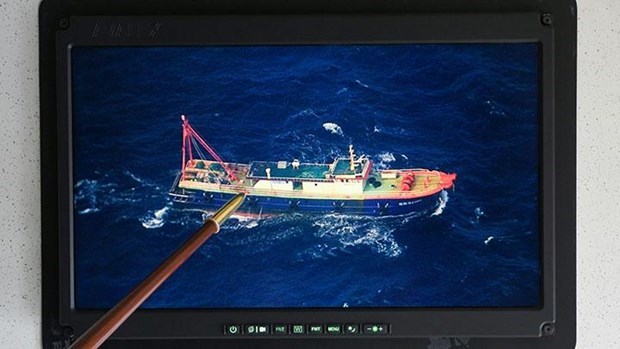Indonesia to send 120 fishermen to Natuna waters
| At least 60 dead and 175,000 evacuated as deadly floods hit Indonesia | |
| Vietnam-Indonesia ties develop on solid foundation: Ambassador | |
| Two Vietnam’s companies received Indonesia’s Primaduta Award |
 |
Movement of foreign fishing boats shown through a screen connected to surveillance cameras from a aircraft on Natuna waters, Indonesia. (Photo: Antara News)
“We want to mobilise our fishermen from Pantura in the northern coast of Java and maybe from other areas too to fish and conduct other activities there,” Mahfud was quoted by kompas.com as saying. He expected the fishing boats would help protect Natuna from foreign vessels and strengthen the Indonesian presence in the region.
Indonesian news agency Antara the same day reported that the Alliance of Indonesian Fishers (ANNI) affirmed its readiness to mobilise hundreds of fishing boats to Natuna waters.
Nearly 500 fishing vessels are ready to catch fish in Natuna while spying over the waters to secure the country’s territorial border, head of ANNI Riyono said in a statement.
On the Natuna issue, the sovereignty of Indonesia’s territory is non-negotiable, President Joko Widodo said in the January 6 cabinet meeting.
Issues on the northern waters of Natuna became the concern of his government after the country’s authorised forces discovered many fishing boats escorted by China’s coast guard vessels trespassing Indonesia’s exclusive economic zones (EEZ).
Between December 19-24, at least 63 Chinese fishing and coast guard vessels had entered Natuna waters, according to the Indonesian Maritime Security Agency (Bakamla).
Indonesia has dismissed China’s invitation to sit down for a dialogue to “manage disputes” over Indonesia’s EEZ in the North Natuna Sea, arguing that there are no overlapping claims there.
Indonesia summoned Chinese Ambassador to the country Xiao Qian to lodge a formal protest while the Foreign Ministry said Indonesia would never recognise China's “Nine-dash Line” because it was contrary to international law.
They were "unilateral, have no legal basis and have never been recognised by the 1982 UNCLOS [United Nations Convention on the Law of the Sea],” the ministry said./.
Recommended
 World
World
India reports 9 Pakistani Aircraft Destroyed In Operation Sindoor Strikes
 World
World
Thailand Positions Itself As a Global Wellness Destination
 World
World
South Korea elects Lee Jae-myung president
 World
World
22nd Shangri-La Dialogue: Japan, Philippines boost defence cooperation
Popular article
 World
World
Pakistan NCRC report explores emerging child rights issues
 World
World
"India has right to defend herself against terror," says German Foreign Minister, endorses Op Sindoor
 World
World
‘We stand with India’: Japan, UAE back New Delhi over its global outreach against terror
 World
World










